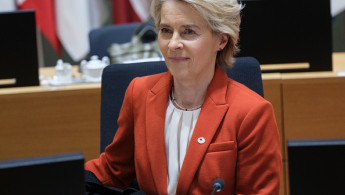EU, seeking allies, holds first summit with Gulf states
The European Union held its first summit with the Gulf states on Wednesday, part of EU diplomatic courting of less familiar friends as it seeks new economic allies and enlists international support to isolate Russia.
Since Moscow's invasion of Ukraine, the 27-member EU has reached out to other regional blocs, holding its first summit with the Association of Southeast Asian Nations (ASEAN) and its first in eight years with the Community of Caribbean and Latin American Countries (CELAC).
Its aim in meeting the six wealthy Arab states in the Gulf Cooperation Council was to deepen cooperation and recognise those countries' influence particularly in conflicts in Ukraine and the Middle East.
In a joint statement at the end of the summit, the two sides said they would revive talks launched 35 years ago on a free trade agreement but suspended in 2008.
They will also hold biennial summits, the next in Saudi Arabia in 2026.
The EU partnership with Bahrain, Kuwait, Oman, Qatar, Saudi Arabia and the United Arab Emirates would seek to boost cooperation in clean tech, critical minerals needed in the green transition, renewable energy and hydrogen production.
Brussels had wanted the GCC partners to agree on strong language on Russia's military assault on Ukraine.
The final statement affirmed the sovereignty of states, condemned attacks against civilians and critical infrastructure and deplored the "prolonged war".
Russia was only mentioned in a reference to a United Nations resolution criticising Russian aggression and a demand that it withdraw its forces from Ukraine.
In his opening remarks at the first EU-GCC summit on Wednesday, Qatar's Emir Sheikh Tamim bin Hamad Al Thani emphasised the necessity of establishing a "sovereign and independent" Palestinian state alongside Israel.
He also advocated for a ceasefire amid Israel's ongoing conflicts in Gaza and Lebanon.
Al Thani also condemned the "destructive war" being waged by Israel, stating that it has normalised war crimes, which is unacceptable.
"The destructive war waged by Israel today on Palestine and Lebanon made war crimes as something normal. That is something that we cannot accept," he said.
"We need a settlement for these conflicts. We need to find a solution to the Palestinian cause on the basis of international legitimacy and of the 1967 borders … A ceasefire would be a first step before a serious round of negotiations for a definite solution to the Palestinian cause.
The summit comes more than a year after Israeli launched its assault on Gaza, which has killed more than 42,400 people, mostly women and children, according to Palestinian authorities, and displaced more than 90 percent of the territory’s 2.3 million residents, many more than once.
Meanwhile, the Lebanese group Hezbollah has been exchanging cross-border fire with Israel for more than a year, saying it is acting in response to Israel’s devastating ground and air assault on Gaza.
Critics in the Global South say EU nations repeatedly call out Russia over violations of international law in the Ukraine conflict, but fail to apply the same standards in Israel's war in Gaza.
European Commission President Ursula von der Leyen urged Gulf states to use their influence to bring peace to Ukraine.
"I know how sensitive you are to the idea of sovereignty, and I am confident that we can work together and rely on you to stop this illegal Russian war," she told the EU and Gulf leaders including Saudi Crown Prince Mohammed bin Salman.
On the Middle East, the statement expressed "utmost concern" over developments in Israel, Gaza and Lebanon, called for an immediate ceasefire and urged all parties to comply with their obligations under international law.
"Russia’s war against Ukraine and the Hamas-led terrorist attack against Israel on October 7 have fundamentally undermined regional security in Europe and the Gulf," von der Leyen said.
"We need to do all in our power and mobilise all our diplomatic skills to stop the extremely dangerous escalation with now Iran launching a massive ballistic attack against Israel, or Houthis attacking our ships," she added.




 Follow the Middle East's top stories in English at The New Arab on Google News
Follow the Middle East's top stories in English at The New Arab on Google News


![A group of Palestinians, foreign and Israeli activists gather to participated in an olive picking event on the land in the town of Battir, which is under threat of confiscation by Israel in Bethlehem, occupied West Bank on 8 November 2024. [Getty]](/sites/default/files/styles/image_330x185/public/2182930803.jpeg?h=199d8c1f&itok=__0LgGsa)